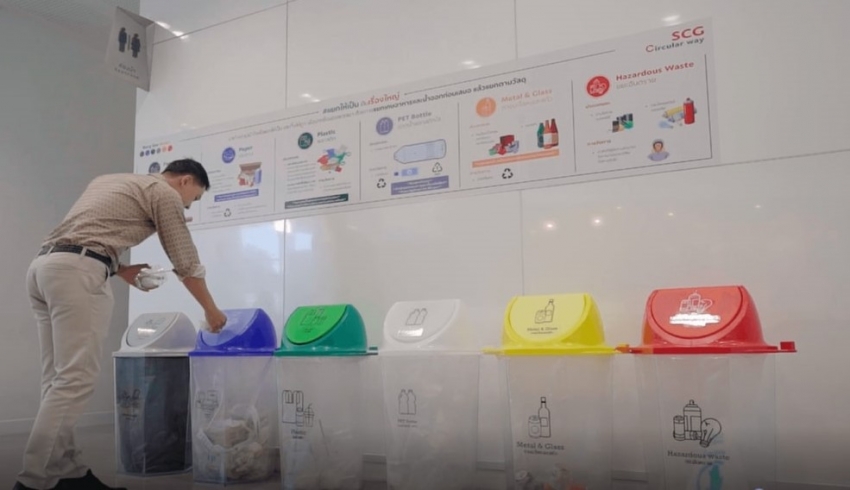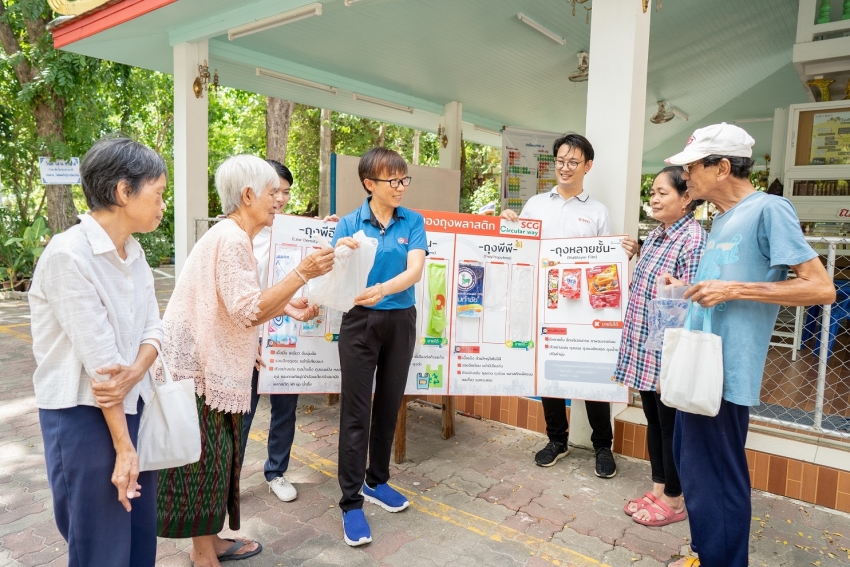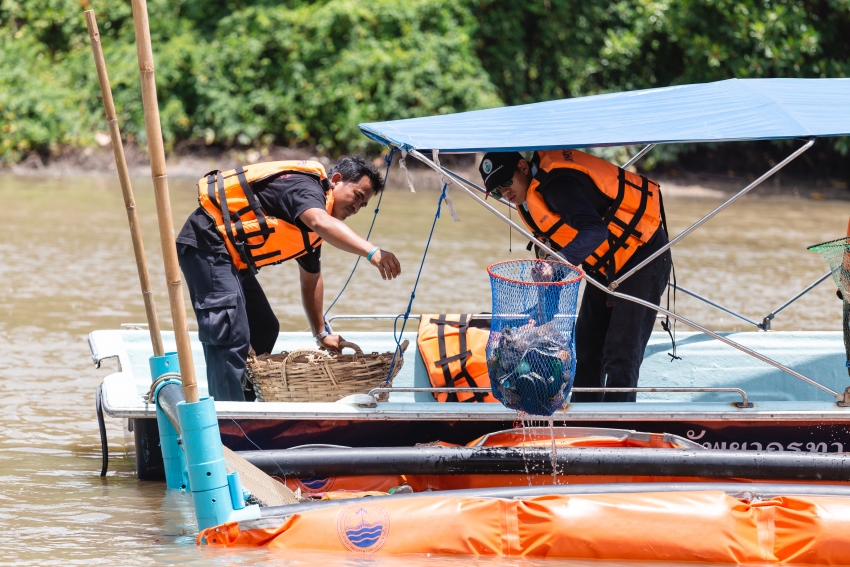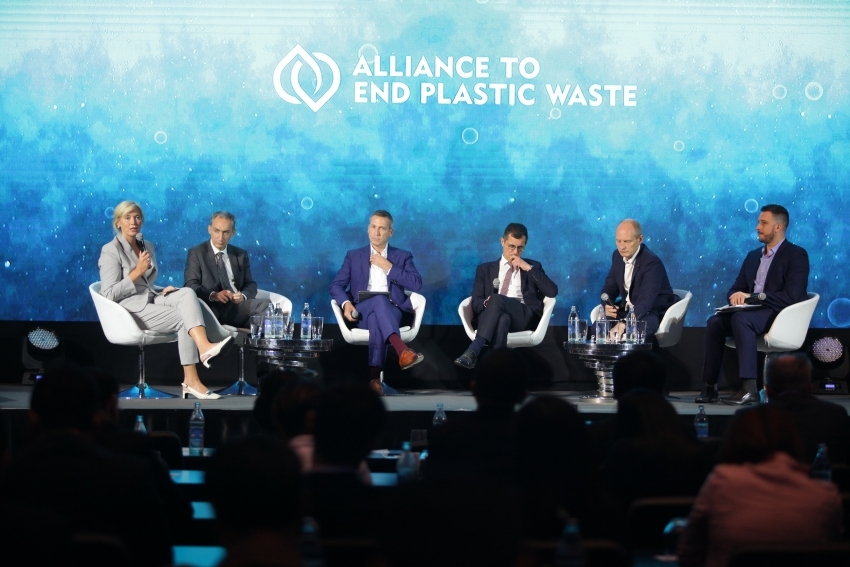The SD Symposium 10 Years Circular Economy: Collaboration for Action, held in September of 2019, is proof of the success of the Circular Way, the approach to which SCG is committed in its quest to develop the organization into a model for other Thai companies to conduct business under the principles of circular economy. Presently, SCG continues to strive towards integrating the principles and practice into every function of the organization in order to further encourage this business model, which fulfills sustainability criteria in all facets, whether economically, socially, or environmentally, to become more accepted and more widely adopted.
The problem of waste is yet another national issue that SCG places great importance on and that the company seeks to help solve by integrating the concept of circular economy as the basis of ideas and practices in order to find a systematic and sustainable solution to the crisis.
From the Inside Out
Originating within the organization and later expanding to benefit communities, the waste management program dubbed the Bang Sue Model is SCG’s formula for success in applying the circular economy concept, which places importance on circulating natural resources within the value chain and improving the efficiency of managing waste, raw material, expired products, and energy, so that these resources can be circulated back into the system with the appropriate processes. Moreover, this model is also an important mechanism driving the creation of infrastructure to support the processing of waste for recycling, and, most importantly, it is conducive to promoting positive habits among employees under the “resource maximization, correct sorting, and proper disposal.”
SCG’s internal waste management program was a success, consistently reducing the amount of trash sent to landfills and increasing recycling, as well as effectively lowering greenhouse gas emissions.
The success within the organization inspired SCG to extend the benefits of the Bang Sue Model to local communities in Map Ta Phut Municipality of Rayong Province, namely Khod Hin 2, Khod Hin Mittraphap, Khao Pai, Wat Khod Hin, Wat Khod Him Mittraphap 42 School, and the Khao Pai Community Waste Bank, which are target groups that SCG has worked closely with to develop and empower all along. A project entitled “Waste-Free Community” was implemented in these communities to foster coordination among households, schools, temples, and waste banks as a model for waste management from the point of origin with the goal of increasing recycling while decreasing the amount of waste in landfills by empowering community leaders to educate members of their communities on the efficient use of resources under the initiative and guidance of specialists from SCG.
Currently, this program has been in operation for one year and has already yielded 6,500 kilograms of recycling, thus significantly reducing the amount of waste being sent to landfills. SCG has set a goal of increasing the number of communities and households involved in the program in order to promote and support Rayong’s progress towards being a waste-free city in the future.
Innovation: Solution for sustainability
Aside from being a model organization in sustainability by using the concept of circular economy as a foundation for instilling good values among personnel and driving the business towards stable growth, SCG also places importance on utilizing digital technology to promote sustainability. An interesting example of this is the use of KoomKah, a web application for optimizing comprehensive waste bank management, to increase the efficiency of the “Bang Sue Model” and “Waste-Free Community” projects. This tool records and organizes data on waste bank operations, such as balance, purchase and sales history, member information along with point redemption history, product info by category, funds, and points accumulated from purchasing products, making it possible to plan a better sales strategy. The application also assists in preparing waste purchasing and sales reports, allowing users to generate reports for specific time periods and download them as an Excel file for easy calculation.
Additionally, the invention and development of the following innovative equipment for treating wastewater is another example of SCG’s success in applying its expertise in innovation to finding solutions that correspond with the concept of circular economy:
- DIY Grease Trap: These traps are made out of materials that are readily available, economically priced, easy to assemble, and can be installed immediately in a household to filter out food waste and intercept grease before wastewater enters the sewage system.
- Aquonic 600: This technology helps treat and purify domestic wastewater through bio- and electrochemical processes, yielding treated water that is free from germs, color, and odor and can be reused effectively. This innovation builds upon the technology of the hygienic toilet system on which Chemicals Business, SCG collaborated with the Asian Institute of Technology (AIT) under the support of the Bill & Melinda Gates Foundation.
- HDPE-Bone Litter Trap: Equipped from the oil booms that the Department of Marine and Coastal Resources (DMCR) invented in 2018, this innovation is made out of special grade HDPE plastic, resulting in increased buoyancy and efficiency in collecting floating trash and debris, UV resistance, and a lifespan of over 25 years. It is also easier to install and can also be recycled after use in accordance with the concept of circular economy.
These three innovations have helped to improve the quality of domestic wastewater before it is released into Khlong Prem Prachakon. The litter traps have been installed in a total of 24 areas in 13 provinces nationwide, collecting over 40 tons of trash, which the Network of Volunteer Marine Rangers, staff from the DMCR, and local municipal officials collaborated to collect, sort, and process for proper disposal.
Building collaboration, maximizing results
Although cultivating a circular economy mindset within the organization and passing it on to local communities is a strategy that SCG has consistently implemented, another important key to the success of driving forward an approach that is beneficial to businesses, society, and the environment is open collaboration.
SCG has consistently sought to build a network of allies and foster involvement from all sectors, whether nationally or internationally. At the national level, the Department of Marine and Coastal Resources is one key example of a government agency working in close collaboration with SCG. At the international level, SCG has collaborated with various organizations, such as the Alliance to End Plastic Waste (AEPW), the only non-profit organization in the world with membership consisting of companies from all sectors of the plastics value chain joining together to address the problem of marine trash through waste management solutions, and The Ocean Cleanup, a world-class environmental technology start-up, to research and develop technology that will alleviate the problem of marine litter in Thailand.
Even though the problem of waste in Thailand may not be possible to resolve and mitigate immediately, SCG is committed to continuing to campaign and instill awareness and knowledge of waste management in all sectors through various projects, develop innovations to enhance the efficiency of programs, and build partnerships and networks both within the country and internationally to find solutions, all upon the foundation of circular economy, which will help foster stable and sustainable growth for businesses, society, and the environment.








